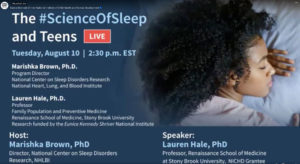Back to School Sleep Tips
With children and teens heading back to school, it’s a good time to prioritize sleep as we adjust to new schedules. Good sleep health can help improve mood, attention, academic performance, and reduce stress.
Establish a Sleep and Wake Schedule: Sleep and wake times may naturally drift during the summer months. Moving back to a regular sleep routine a week before school begins can help children and teens begin the school year well-rested. Shift bed and wake times by 10-15 minutes a day until you’re back on the schedule you want.
Setting consistent times for sleep and wake will help children and teens stick to a regular sleep schedule. Keep in mind that children and teens have different sleep needs:
- Children: Preschoolers (3-5 years) 10 to 13 hours
- School-age kids (6-13 years) 9 to 11 hours
- Teenagers: (14-17 years) 8 to 10 hours
Also, it’s helpful to consider that children’s biological sleep and wake time (sometimes called their chronotype) change with age. As children get older, their natural sleep/wake schedule will shift so they both get sleepy and wake up later. This normal shift to a later schedule is biological and reaches a peak in their early 20s.
Keeping these natural tendencies in mind can help to balance how long and when children need to sleep with their school start times. National Sleep Foundation recommends school not start for middle and high school students before 8:30 AM.
Model Good Habits: Help each of your family members be their Best Slept Self® by modeling good sleep habits during the day and night. It’s important that children and teens understand the importance of sleep for their health.
- During the day:
- Spend time in natural light, especially in the morning. Whether outdoors or inside, bright daylight helps you feel alert.
- Exercise regularly. Aim for 30 minutes a day to increase your drive to sleep at night as well as reduce stress and improve mood.
- Eat meals at consistent times day after day.
- At night:
- Avoid heavy meals, nicotine, caffeine, and alcohol before bed.
- Use a consistent routine with a relaxing wind down to help get the sleep you need.
- Put the devices away an hour before bed and sleep in an environment that is dark, quiet, and cool.
Watch this National Institutes of Health (NIH) Q&A with National Sleep Foundation Past Chair Dr. Lauren Hale on the science of sleep and teens. Dr. Hale’s presentation begins at 8:17.
Heading back to school can be an exciting time. As part of NSF’s Bright Schools® initiative, NSF is committed to adolescent health and educating school-aged children and their families about the natural sleep/wake process and the importance of sleep for health.


